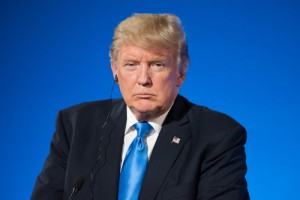Did Mueller say Trump lied to special counsel in written answers? Clarifications offered

President Donald Trump. Image from Shutterstock.com.
Former special counsel Robert Mueller raised eyebrows during his congressional testimony Wednesday when he appeared to make two stunning assertions about President Donald Trump’s culpability.
Mueller later walked back one of the comments, while a source clarified the other in an interview with the Washington Post.
In one comment, Mueller appeared to agree that Trump had shown signs of being untruthful in his written answers made under oath to the special counsel’s office. ABC News had the exchange; a transcript is here.
U.S. Rep. Val Demings, a Florida Democrat, asked this question: “Director Mueller, isn’t it fair to say that the president’s written answers were not only inadequate and incomplete, because he didn’t answer many of your questions, but where he did, his answers showed that he wasn’t always being truthful?”
“I would say generally,” Mueller said.
A source familiar with Mueller’s account told the Washington Post that Mueller was focused on Trump’s answers being incomplete rather than untruthful.
“In answering ‘generally,’ Mueller did not mean to agree with every phrase in that question,” the source told the Post. “The Mueller report, which is the statement of record here, is what stands, and in the Mueller report, it states that the president’s written answers were ‘incomplete’ or ‘imprecise.’ ”
The Washington Post story also points out that Mueller used the “generally” answer at other points in his testimony to signal agreement with parts of long questions.
In the second comment, Mueller appeared to agree that he didn’t indict Trump for obstruction of justice because of an Office of Legal Counsel opinion that says he can’t indict a sitting president. CNN and NBC News have the exchange and Mueller’s later clarification; a transcript is here.
Rep. Ted Lieu, a California Democrat, talked about the elements needed to prove the crime of obstruction of justice and asked this question: “I believe a reasonable person looking at these facts could conclude that all three elements of the crime of obstruction of justice have been met, and I’d like to ask you the reason, again, that you did not indict Donald Trump is because of OLC opinion stating that you cannot indict a sitting president, correct?”
“That is correct,” Mueller replied.
That response contradicted Mueller’s report, which said the special counsel didn’t make a decision on whether to indict Trump because of the OLC opinion.
Mueller later clarified his response to Lieu. “That is not the correct way to say it,” Mueller said. “We did not reach a determination as to whether the president committed a crime.”
Politico lined up several experts who wrote about their take on the hearings.
Fordham law professor Jed Handelsman Shugerman noted Mueller’s comments on the OLC opinion. He also noted Mueller’s agreement that Department of Justice policy allows for the indictment of a president after the president leaves office.
Rep. Mike Quigley, an Illinois Democrat, raised a related issue with this question: “What if a president serves beyond the statute of limitations?”
Mueller said he didn’t know the answer to the question.
Shugerman said the problem is that a two-term president could run the statute of limitations and avoid prosecution. The OLC memo had assumed that a judge could toll the statute of limitations, but it cited no precedent for such power, he said.
“And thus, Quigley set up a new legal argument for impeachment: The statute of limitations means a president could be permanently above the law,” Shugerman wrote. “A House impeachment could be the only opportunity to hold Trump accountable or even accuse him legally. Ever.”



